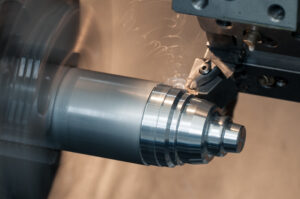Introduction
In the world of precision manufacturing, the integration of Computer Numerical Control (CNC) technology has brought about a paradigm shift in the way prototype machine shops operate. One of the key advancements in this domain is CNC turning, a machining process that has redefined the capabilities of prototype production. In this blog, we will explore the significance of CNC turning in modern prototype machine shops, emphasizing the crucial role it plays in delivering high-quality prototypes with unmatched precision and efficiency.
Understanding CNC Turning and its Importance
CNC turning is a cutting-edge machining process that involves rotating a workpiece while a cutting tool is used to remove material, resulting in a final product with the desired shape and specifications. Unlike conventional methods, where manual intervention can lead to human errors and inconsistencies, CNC turning is entirely automated, and controlled by a computer program. This automation ensures that prototypes are manufactured with unparalleled accuracy and repeatability.
Advantages of CNC Turning in Prototype Machine Shops

Enhanced Precision:
The most significant advantage of using CNC turning in prototype machine shops is its ability to achieve exceptional precision. The computer-controlled process eliminates the chances of human errors, ensuring that the prototype’s dimensions and tolerances are consistently accurate.
Faster Turnaround Times:
Time is of the essence in the prototyping phase, and CNC turning helps significantly reduce production time. The automated nature of the process allows for faster material removal and smoother operations, resulting in quicker delivery of prototypes to clients.
Cost-Effectiveness:
While CNC turning initially requires an investment in the equipment and software, the long-term benefits far outweigh the costs. The efficiency and precision of CNC turning reduce material wastage, lowering production costs and ultimately benefiting the clients with more competitive pricing.
Versatility:
CNC turning machines can work with various materials, such as metals, plastics, and composites, expanding the possibilities for prototyping in different industries. From aerospace components to medical devices, CNC turning can cater to a diverse range of applications.
Impact of CNC Turning on Prototype Iteration and Testing
In the iterative process of prototype development, precision and efficiency are crucial for success. CNC turning’s ability to rapidly produce high-quality prototypes allows for quick iteration and testing. Manufacturers can fine-tune designs and identify any flaws or improvements before moving forward to full-scale production. This iterative approach not only saves time and resources but also ensures the end product meets the client’s exact requirements.
How CNC Turning Empowers Innovation
Innovation is at the heart of prototype machine shops, and CNC turning is a driving force behind this innovation. The technology’s ability to handle complex designs and intricate geometries opens doors to creative possibilities. Designers and engineers can experiment with intricate shapes, optimizing products for performance, functionality, and aesthetics.
Finding the Right Prototype Machine Shop
For businesses seeking reliable and high-quality prototype production, partnering with the right machine shop is crucial. When searching for a prototype machine shop that utilizes CNC turning, consider the following factors:
Experience and Expertise:
Look for a machine shop with a proven track record in CNC turning and prototype manufacturing. A wealth of experience ensures they can handle various projects and deliver consistent results.
State-of-the-Art Facilities:
Ensure the machine shop is equipped with modern CNC turning machines and other cutting-edge equipment. This ensures the efficiency and quality of the prototypes they produce.
Material Capabilities:
Check if the machine shop can work with the materials relevant to your project. Different industries may require specific materials, and the shop should be equipped to handle your requirements.
Conclusion
CNC turning has undoubtedly transformed prototype machine shops, revolutionizing the way precision prototypes are produced. Its advantages in terms of precision, speed, cost-effectiveness, and versatility make it an indispensable tool in modern manufacturing. As the demand for innovation continues to drive industries forward, CNC turning will remain at the forefront of prototype production, shaping a future of endless possibilities. When seeking a prototype machine shop for your next project, prioritize those with CNC turning capabilities to ensure your designs are brought to life with the highest level of precision and efficiency.

